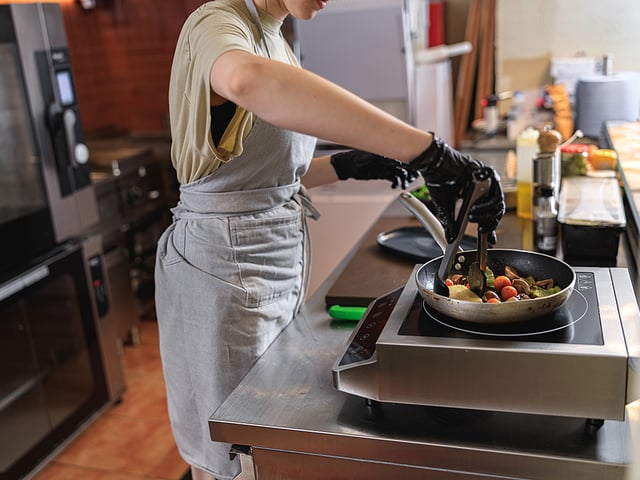
ServSafe Food Handler vs. ServSafe Manager: Which Course is Right for You?
The food service industry requires stringent adherence to safety and hygiene protocols. This commitment to safety involves comprehensive training for employees at various levels of the organization. Two such programs, offered by the National Restaurant Association, include the ServSafe Food Handler and ServSafe Manager courses. Both courses offer valuable skills, but cater to different needs and roles within the food industry. Understanding the difference between the two can help determine which program is best for you or your employees.
What is ServSafe?
Established by the National Restaurant Association, ServSafe is one of the leading food and beverage safety training programs worldwide. The initiative aims to provide crucial knowledge and skills to those involved in the food service industry, emphasizing the significance of proper food handling techniques and procedures to diminish the potential of foodborne illnesses.
ServSafe was conceived as a response to the urgent need for comprehensive food safety education within the industry. Foodborne illnesses can lead to severe consequences for both consumers and businesses, including health complications, reputational damage, and significant financial losses. By instituting rigorous food safety standards, ServSafe aims to protect both businesses and their customers from these potential risks.
The program’s curriculum is designed based on the Food and Drug Administration’s (FDA) Food Code and is frequently updated to reflect changes and advancements in food safety research, regulations, and best practices. This ensures that ServSafe always delivers the most relevant and up-to-date knowledge to its participants.
ServSafe offers several different courses and certifications, tailored to meet the needs of various roles within the food service industry. The courses range from entry-level food safety education (ServSafe Food Handler) to more advanced programs aimed at managers and supervisors (ServSafe Manager), as well as specialized courses for alcohol service (ServSafe Alcohol), allergen training (ServSafe Allergens), and more.
To enhance accessibility, ServSafe offers flexibility in how courses are taken. Participants can choose to complete their training through online courses, in-person instructor-led courses, or even through a combination of both. This diversity in learning methods allows individuals to choose the option that best suits their learning style and availability.
Upon completion of the course, participants take a certification exam. If passed, they receive a ServSafe certificate, which is recognized and often required by many regulatory agencies and employers across the United States and beyond. This certification, valid for a specific period (usually five years), serves as an affirmation of the holder’s knowledge and adherence to food safety standards, enhancing their credibility within the industry.
In essence, ServSafe is more than just a certification program; it’s an initiative aimed at fostering a culture of food safety across the industry. It equips food service workers with the necessary knowledge and skills to handle food safely, and in doing so, helps protect the health of consumers and the reputation of businesses in the food service sector.
ServSafe Food Handler
Designed as an introductory program, the ServSafe Food Handler course focuses on the critical areas of food safety that every entry-level worker in the food industry should understand. Ideal for cooks, servers, dishwashers, and other similar roles, this course ensures that employees are adequately prepared to handle food safely and maintain hygienic work environments.
Basic Food Safety
This part of the course provides an overview of food safety, including why it is vital, and what potential dangers could occur if food safety practices are not followed. It introduces the concept of foodborne illnesses, their sources, and how they can be prevented.
Personal Hygiene
A key component of food safety is personal hygiene. This section emphasizes the importance of cleanliness and personal grooming in the food service environment. Topics include proper handwashing techniques, the correct use of gloves, and general hygiene rules like avoiding work when sick.
Cross-Contamination and Allergens
Cross-contamination is a significant source of foodborne illnesses. This portion of the course teaches participants about different types of cross-contamination and how to prevent them. It also covers food allergens, which are a major concern in food service. Participants learn about common food allergens, the dangers of allergic reactions, and how to handle food to prevent allergen cross-contact.
Time and Temperature
Understanding the critical role of time and temperature in food safety is crucial. This section educates learners about the “temperature danger zone,” safe cooking temperatures, proper cooling and reheating procedures, and the importance of timely service and storage.
Cleaning and Sanitation
The course highlights the importance of maintaining a clean and sanitary environment. It covers the correct cleaning and sanitizing procedures for various types of equipment and surfaces, proper procedures for cleaning up after incidents that involve bodily fluids, and the importance of pest management.
After going through the above topics, participants are assessed via a test. On passing this assessment, they earn their ServSafe Food Handler Certificate. This certificate not only validates their understanding of the essential aspects of food safety but also gives them a competitive edge in the food industry job market, where such certifications are highly valued.
Ultimately, the ServSafe Food Handler course lays the foundation for food safety practices, creating a safer, more accountable industry that takes the health and well-being of its customers seriously. Regardless of the specific role in the food industry, this course is a fundamental stepping stone towards a safer food service environment.
ServSafe Manager
The ServSafe Manager course is a robust and comprehensive food safety training program, curated for individuals who occupy or aspire to take on managerial roles within the food service industry. This course delves deeper into the complexities of food safety, equipping learners with the knowledge needed to effectively manage and maintain food safety protocols in their establishments.
Foodborne Microorganisms and Allergens
A significant part of the Manager course is dedicated to understanding foodborne pathogens and allergens. Learners get an in-depth understanding of various types of foodborne microorganisms, their sources, growth factors, and how they can be controlled. Similarly, the course provides a more comprehensive view of food allergens, outlining the processes for managing allergens in a food preparation environment and educating about the legal responsibilities regarding allergens.
Personal Hygiene
The personal hygiene segment of this course reinforces the hygiene practices taught in the Food Handler course while expanding on the role managers play in enforcing these hygiene practices within their teams. Topics include the importance of role modeling good hygiene, employee health policies, and managing personal behaviors that can affect food safety.
Purchasing, Receiving, and Storage
This section provides guidance on how to ensure food safety beginning at the procurement stage. It covers best practices for purchasing from approved, reputable suppliers, properly receiving and inspecting food shipments, and correctly storing food to maintain its safety and quality.
Preparation, Cooking, and Serving
The course explores in detail the proper procedures for preparing, cooking, and serving food. It emphasizes critical control points, such as cooking at the right temperatures, cooling food correctly, and using the right procedures for thawing and reheating food. Additionally, it highlights how to avoid common errors that can lead to food contamination.
Facilities, Cleaning/Sanitation, and Pest Management
Managers are taught how to design and maintain a facility that promotes food safety. The course covers topics like proper lighting, ventilation, equipment maintenance, waste disposal, and the design and layout of the premises. It also delves deeper into cleaning and sanitation protocols, including how to develop a cleaning schedule, choose and use cleaning and sanitizing agents correctly, and manage waste properly. Additionally, it covers how to implement effective pest management programs.
On completion of the course, participants must pass the ServSafe Food Protection Manager Certification Examination. This comprehensive exam tests the participants’ understanding of food safety concepts and their ability to implement and manage a food safety program. Successful participants receive the ServSafe Manager certification, a nationally recognized certification validating their in-depth knowledge and ability to oversee food safety operations.
It’s worth noting that many states require at least one person with the ServSafe Manager certification or equivalent on the premises during operational hours. This requirement further underscores the high regard for ServSafe’s robust curriculum and its importance in maintaining a safe and healthy food service environment.
In summary, the ServSafe Manager course serves as a crucial tool in enhancing food safety culture within an establishment. It empowers managers with the knowledge and skills necessary to lead their teams in maintaining the highest standards of food safety, ultimately protecting the health of consumers and the reputation of the business.
Choosing Between the Two
When choosing between the ServSafe Food Handler and ServSafe Manager courses, it’s important to consider various factors that could influence which program aligns best with your needs and career ambitions. Each course provides specific training and certification that may be more or less relevant to your current role, future career goals, or even regulatory requirements.
Role Relevance
Consider your current role in the food service industry. If you’re an entry-level worker like a line cook, server, or dishwasher, the ServSafe Food Handler course could be your ideal choice. This course provides fundamental food safety training that every food service worker should possess. It covers the basics of food safety, personal hygiene, cross-contamination, and allergens, as well as time and temperature controls and cleaning and sanitation practices.
On the other hand, if you are or aspire to be in a supervisory role, such as a kitchen manager, restaurant owner, or even a health department official, the ServSafe Manager course might be more beneficial. This course offers a more advanced and comprehensive look at food safety, covering topics like foodborne microorganisms and allergens, personal hygiene, purchasing, receiving, and storage, preparation, cooking, and serving, and facilities and pest management.
Career Aspirations
Your future career goals also play a critical part in deciding which course is more suitable. If you aim to progress within the food service industry and take on more responsibilities or management roles, acquiring a ServSafe Manager certification can give you an edge over others. This certification not only attests to your advanced knowledge of food safety but also your ability to manage food safety operations, which is a valuable skill for higher-level roles in the industry.
Regulatory Requirements
In some cases, your choice might be influenced by the requirements of local health departments or specific employers. Some states require that each establishment have at least one person with a ServSafe Manager certification or equivalent on duty during all operational hours. If you work in such a state or are seeking a job that stipulates this requirement, you would need to take the ServSafe Manager course.
In conclusion, choosing between the ServSafe Food Handler and ServSafe Manager courses should be a thoughtful decision that takes into account your current role, future career aspirations, and possible regulatory demands. Both courses provide a wealth of knowledge on food safety, catered to various degrees of responsibility within the food service industry.
One effective way to ensure your success in these courses is to utilize practice tests as a part of your study routine. These tests will give you a sense of the type of questions you’ll face and the areas where you may need to focus your review. They are invaluable tools to bolster your confidence and ensure you are well-prepared for the actual exam.
Regardless of the path you select, these courses will significantly enhance your understanding of food safety, transforming you into a more informed, conscientious, and valuable member of the food service industry. Beyond personal career growth, these courses play a pivotal role in safeguarding the health and well-being of both employees and customers in the food service environment, reinforcing the overarching importance of food safety in every aspect of the industry.
Keep Reading

ServSafe Food and Alcohol Safety Exams Blog
How Long Does ServSafe Certification Last?
The ServSafe certification is a critical credential for professionals i…

ServSafe Food and Alcohol Safety Exams Blog
The Big Eight Food Allergens are Now the Big Nine
An allergen is typically a harmless protein that, for some, the immune …

ServSafe Food and Alcohol Safety Exams Blog
How Many Times Can I Fail the ServSafe Exam?
The ServSafe exam is a nationally recognized food safety certification …